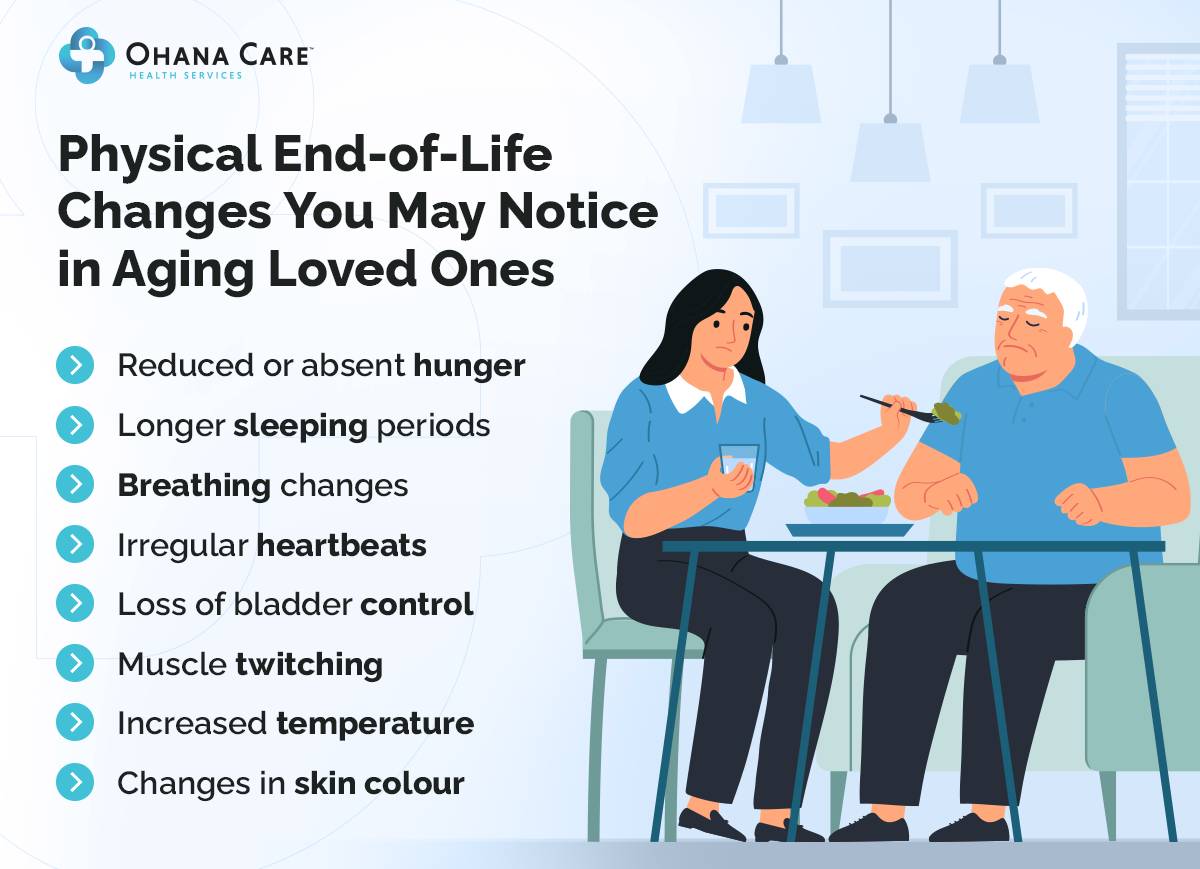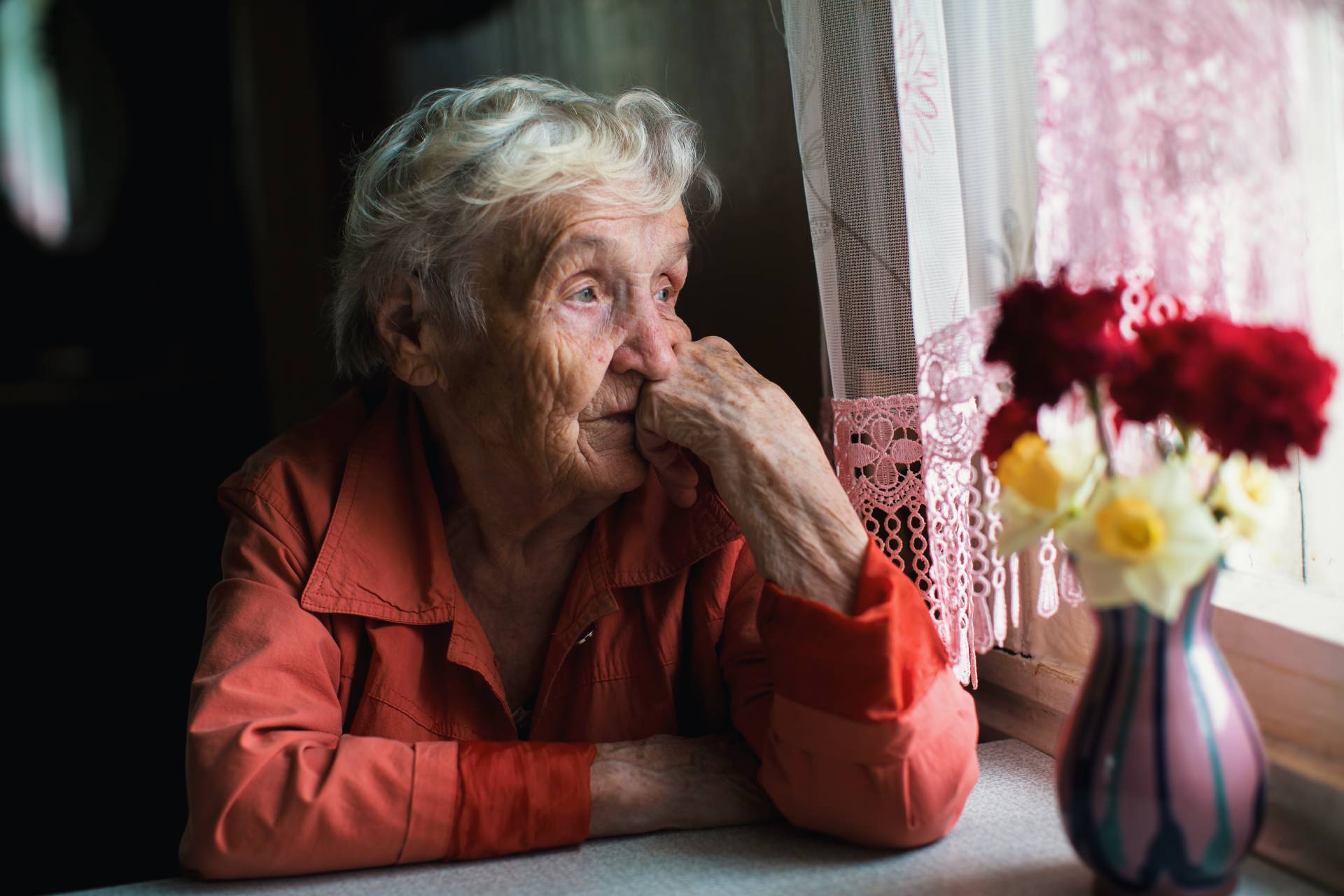The thought of losing a loved one is hard.
Imagining a life where you can no longer call or visit them feels unreal, something that happens to others but not to you.
However, accepting this reality is an important part of the end-of-life journey.
Understanding the signs that mark the end of life is not just about preparing yourself but also about offering your loved one the best care and support possible during their final days.
In this blog post, we’re exploring physical and emotional signs that may signal the end of life in aging adults to help you navigate this difficult time with understanding, compassion, and love.
Please note that your aging parents may not experience all of these emotional and physical symptoms. It’s always best to consult with a healthcare professional about any concerns you may have about the health of a loved one.
Physical Changes

Although not all end-of-life signs are physically noticeable, there are a handful that you may observe in your loved one.
It’s important to note that some individuals may feel uncomfortable or embarrassed sharing these signs with you. If they mention they are struggling with bladder control or that they can’t sleep, ensure you create a safe space for them to talk with you about their concerns.
Reassuring them that these changes are natural can help them feel more comfortable discussing what they are experiencing so that you can ensure they continue to receive proper care.
1. Decreased Appetite & Thirst
According to HebrewSeniorLife, 15-30% of seniors experience anorexia due to aging. This lack of nourishment is commonly due to the digestive system naturally slowing down.
If your loved one’s metabolism decreases and you may notice them eating or drinking less than usual, encourage them to take small sips of water or eat light, soft foods like soup and crackers.
2. Changes in Breathing
When you near your final days, your organs and vital functions, like the respiratory system, gradually shut down. As circulation and oxygen levels reduce, shallow breaths, pauses between breaths, or a fluid build-up causing a “death rattle” sound may become noticeable.
3. Fatigue and Sleep
The Canadian 24-Hour Movement Guideline for Adults recommends seniors sleep for 7 to 8 hours a night. If you notice your loved one sleeping more or taking excessive naps, it may be a sign that they are nearing the end of life.
4. Cold Hands and Feet
When you age, circulation slows down. Due to this lack of blood flow throughout the body, you may notice that your loved one’s hands, feet, or legs feel cold or look discoloured.
It’s a great idea to have warm socks, comfy sweaters, and blankets around to help keep their body temperature comfortable.
5. Loss of Bladder and Bowel Control
According to the Government of Canada, more than 1 in 5 seniors experience some form of bladder control issue as they age.
Although urinary incontinence can cause embarrassment or isolation, there are a variety of things you can encourage your loved one to do to manage the loss of bladder control, including:
- Using adult diapers
- Doing Kegel exercises to strengthen the pelvic floor muscles
- Limiting caffeine
- Wearing clothing that is easy to remove when in the bathroom
6. Decreased Urine Output
While losing bladder control is very common, having a decreased urine output is also common. As the body’s systems begin to shut down, the kidneys may produce less urine, resulting in fewer washroom breaks.
7. Muscle Weakness
You may notice that your loved one becomes too weak to perform basic movements such as lifting their head, sitting up, or moving in bed.
To try and keep their muscles strong, encourage your loved one to do safe and effective at-home exercises, such as:
- Standing from a chair
- Seated toe taps
- Chair running
- Seated abdominal twist
- Seated jumping jacks
8. Increased Restlessness
Restlessness or agitation is another end-of-life sign that may occur. This could present itself as fidgeting, picking at bedsheets, or other repetitive movements.
Offering calm reassurance or playing soft music can help ease feelings of restlessness.
9. Changes in Skin Colour
As circulation decreases due to the heart slowing down and blood flow decreasing, you may notice your loved one looking more pale or bluish. Typically, the change in skin colour is most noticeable on the hands, feet, and face.
10. Irregular Heartbeat
Many seniors experience an irregular heartbeat called arrhythmia, where the pulse becomes weaker or inconsistent as the body slowly begins to shut down.
Emotional and Mental Shifts

When your loved one is approaching death, they may exhibit various emotional and mental changes that seem out of the norm.
These changes may be difficult for you to experience, but it’s important that you know they are a natural part of the end-of-life journey.
11. Withdrawal from Social Interaction
It’s common for elderly adults to withdraw from social interactions as they near the end of their life.
They may prefer to be alone or limit conversations. Don’t force them to be social, but stay nearby to offer reassurance and emotional support when needed.
12. Confusion and Disorientation
As the body slows down, it may affect your loved one’s memory, leading to moments of confusion or disorientation. Your parent may not recognize familiar faces or may speak of people who have already passed.
13. Decreased Responsiveness
You may notice your loved one becoming less responsive as they near their final days. If you experience this emotional shift, find ways to show them that you are still there for them, such as continuing to talk to them, sharing memories, and holding their hand.
14. Hallucinations or Vivid Dreams
In some cases, elderly individuals nearing the end of life may experience hallucinations or vivid dreams.
They may talk about seeing people who have passed or places they wish to visit. Although this may be uncomfortable for you, be sure to comfort them rather than judge them as these thoughts are out of their control.
15. Expressions of Unresolved Feelings
In some cases, elderly adults may express a need to resolve lingering emotions by excessively sharing memories, asking for forgiveness, or offering wisdom.
Encourage these conversations, as they can bring emotional closure to your aging loved one, you, and other family members or friends.
16. Talking About “Going Home” or Seeing Loved Ones Who Have Passed
It’s not uncommon for individuals nearing the end of life to speak about “going home” or seeing loved ones who have already passed. This can be especially true if their partner or best friend has previously passed.
17. Sudden Moments of Clarity
Sometimes, seniors seem to get a “second wind” before passing. You may notice they seem more alert and engaged in conversations or doing things that you haven’t seen in a while, such as going on short walks. Although this could be a sign that your loved one is doing well, it can also be a sign that they are in their final days.
18. Increased Spirituality
As the end of life approaches, your loved one may seek more spiritual meaning, reflecting on life, faith, and what the next chapter holds.
Providing space for these reflections or arranging for religious, emotional, and spiritual support can be comforting for them.
19. Asking for Reassurance
According to the Government of Canada, almost 1 in 5 Canadian seniors aged 65+ have experienced loneliness.
If your loved one is feeling lonely, they may turn to you to provide reassurance that they will be okay or that they can trust you with their final needs and wishes.
Be sure to provide emotional support while reassuring them that their needs will be met once they pass.
Watch our Podcast on Palliative/End of Life Care
Get the Palliative Care Support Your Loved One Deserves
If any of these end-of-life signs resonate with you, consider getting in-home palliative support for your loved one.
At Ohana Care, we provide in-home end-of-life care that focuses on compassion and gentleness so your loved one feels comfortable during their final days.
Whether your aging loved one needs support with their personal hygiene, meal preparation, companionship, or anything in between, don’t hesitate to reach out for support.
While our caregivers provide support with end-of-life symptoms, you can focus on your emotional connection without the stress of daily caregiving.
Contact us to learn how Ohana Care can support you during this challenging time.



